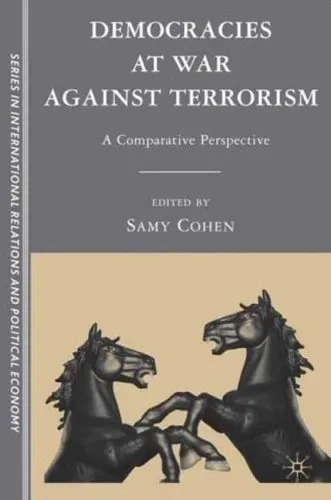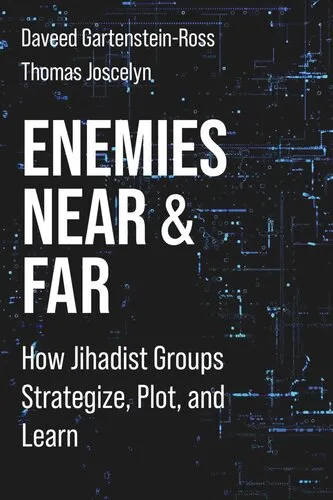Democracies at War against Terrorism: A Comparative Perspective (Sciences Po Series in International Relations and Political Economy)
4.0
بر اساس نظر کاربران

شما میتونید سوالاتتون در باره کتاب رو از هوش مصنوعیش بعد از ورود بپرسید
هر دانلود یا پرسش از هوش مصنوعی 2 امتیاز لازم دارد، برای بدست آوردن امتیاز رایگان، به صفحه ی راهنمای امتیازات سر بزنید و یک سری کار ارزشمند انجام بدینکتاب های مرتبط:
معرفی کتاب "Democracies at War against Terrorism: A Comparative Perspective"
کتاب Democracies at War against Terrorism: A Comparative Perspective اثری جذاب و جامع در زمینه تحلیل عملکرد دموکراسیها در مقابله با تهدیدهای تروریسم است. نویسنده این اثر، "سمی کوهن"، تلاش کرده است تا دیدگاههای نوینی در خصوص چالشهای عملی و نظری کشورهایی با نظامهای دموکراتیک در جنگ علیه تروریسم، ارائه دهد. این کتاب بخشی از سری Sciences Po Series in International Relations and Political Economy است که به مسائل بینالمللی و اقتصاد سیاسی میپردازد.
خلاصهای از کتاب
کتاب حاضر به بررسی و تحلیل تطبیقی واکنش دموکراسیها به تهدیدهای تروریسم میپردازد و نشان میدهد چگونه این کشورها توازن میان امنیت ملی و آزادیهای مدنی را ایجاد کرده یا آن را به چالش کشیدهاند. نویسنده با مطالعه موردی کشورهای مختلف، از جمله ایالات متحده، فرانسه، بریتانیا، و هند، به این سوال پاسخ میدهد که آیا اصول دموکراتیک در جریان عملیاتهای ضدتروریستی حفظ میشوند یا خیر. همچنین، کتاب مباحثی چون نقش فناوری، آموزش، و همکاری بینالمللی در مقابله با تروریسم را نیز پوشش میدهد.
یکی از نقاط برجسته این کتاب، استفاده از دیدگاههای میانرشتهای و ترکیب نظریات روابط بینالملل، علوم سیاسی، و حقوق بشر است. این امر ارزش افزودهای به تحلیلهای نویسنده بخشیده و سبب شده است این کتاب مخاطبان گستردهای داشته باشد؛ از پژوهشگران آکادمیک تا سیاستگذاران و علاقهمندان به مسائل جهانی.
نکات کلیدی کتاب
- چالشهای دموکراسیها در حفظ اصول خود حین مقابله با تهدیدهای امنیتی.
- بررسی تطبیقی عملکرد کشورها در شرایط بحرانی و حملات تروریستی.
- تحلیل پیامدهای سیاسی و اجتماعی سیاستهای ضدتروریستی در کوتاهمدت و بلندمدت.
- نقش همکاریهای بینالمللی و چندجانبهگرایی در مقابله با تروریسم.
جملات معروف از کتاب
"A democracy that sacrifices its values in the name of security risks losing both."
"Terrorism is not just an attack on individuals, but an assault on the principles of open societies."
چرا این کتاب اهمیت دارد؟
با گسترش تهدیدهای تروریسم در سطح جهان، سوالات مهمی در خصوص نحوه مقابله با این تهدیدها در چارچوب دموکراتیک مطرح شده است. این کتاب اهمیت دارد زیرا:
- به سوالات اخلاقی پیرامون محدودیت آزادیها در جنگ علیه تروریسم میپردازد.
- مطالعات تطبیقی آن به سیاستگذاران کمک میکند تا تصمیمگیریهای بهتری انجام دهند.
- چالشهای حفظ حاکمیت قانون در شرایط بحرانی را بهخوبی به تصویر میکشد.
- دیدگاههای بینالمللی متنوعی را بررسی میکند که برای پژوهشگران الهامبخش است.
مطالعه این کتاب برای هر کسی که به روابط بینالملل، علوم سیاسی یا مسائل حقوق بشر علاقهمند است، ضروری به نظر میرسد. این اثر نهتنها تحلیلهای آکادمیک ارائه میدهد، بلکه در سیاستگذاری عملی نیز تاثیرگذار است.
Introduction to "Democracies at War against Terrorism: A Comparative Perspective"
Terrorism has emerged as one of the gravest threats to the global order in the 21st century. In "Democracies at War against Terrorism: A Comparative Perspective," I, Samy Cohen, delve deep into how democracies, as political systems defined by their respect for freedom, human rights, and the rule of law, have adapted to the enormous challenge of combating terrorism. This book takes a comparative lens, analyzing the strategies of various democratic nations, exploring their successes and shortcomings, and examining the impact of these actions on the fundamental values they aim to protect.
While democracies are inherently committed to protecting civil liberties, the nature of terrorism often challenges those commitments. This inherent tension is at the core of the book, which not only presents case studies but also debates the ethical and strategic dilemmas faced by democratically elected governments in their efforts to secure the state without undermining democratic principles.
Detailed Summary of the Book
The book is structured around a set of critical questions: How do democracies respond to terrorism without eroding the very democratic principles they stand for? Are there effective counterterrorism strategies that do not compromise civil liberties? What lessons can democracies learn from each other’s successes and failures? To answer these, the book provides a comparative analysis of several democratic countries, including the United States, the United Kingdom, France, and Israel, among others.
The central argument posits that democracies face distinctive challenges compared to authoritarian regimes when responding to terrorism. Unlike authoritarian systems, democracies must operate within parameters defined by public opinion, legal norms, and an active media. These constraints hinder swift and unilateral actions but also demand a degree of transparency and accountability that can ultimately strengthen democratic institutions if handled wisely.
Organized into thematic chapters, the book examines:
- The political dynamics of decision-making during terror crises.
- The role of intelligence and security services in democratic societies.
- The balance between surveillance and privacy in counterterrorism measures.
- Success and failures of military interventions targeting terrorist organizations.
- The rise in nationalism and its impact on counterterrorism policy.
Each of these chapters is enriched with real-world examples and comparative data to paint a nuanced picture of how different democracies have fared in the fight against terrorism.
Key Takeaways
Here are some key takeaways from this book:
- The paradox of democracies countering terrorism lies in balancing national security with individual freedoms.
- Counterterrorism policies can erode public trust in democratic institutions when transparency and accountability are neglected.
- International cooperation is essential, but its success depends on shared values and mutual trust among democracies.
- A one-size-fits-all counterterrorism approach is ineffective; context-specific strategies are more impactful.
- Military interventions often yield short-term gains but can fuel long-term instability when deployed without a comprehensive political strategy.
Famous Quotes from the Book
"The fight against terrorism tests the resilience of democracy, not just in its ability to repel violence but in its commitment to ideals even under duress."
"In the war on terror, the line between security and authoritarianism is thin. The true measure of a democracy is whether it can uphold its values as it defends its borders."
"The louder the call for immediate security, the easier it is to overlook the gradual erosion of civil liberties."
Why This Book Matters
In an age where terrorism continues to evolve, this book offers invaluable insights for policymakers, academics, and citizens alike. It serves as a cautionary tale about the consequences of overreach in the name of security while providing a roadmap for preserving democratic norms. The comparative perspective presents a rich tapestry of experiences that highlight both pitfalls to avoid and best practices to emulate.
At its heart, "Democracies at War against Terrorism" underscores the importance of vigilance—not just against external threats but also against internal erosion of what makes democracies worth protecting. By highlighting the challenges and opportunities in counterterrorism efforts, this book invites readers to rethink conventional approaches and deepen their understanding of the interconnectedness of security and liberty.
دانلود رایگان مستقیم
You Can Download this book after Login
دسترسی به کتابها از طریق پلتفرمهای قانونی و کتابخانههای عمومی نه تنها از حقوق نویسندگان و ناشران حمایت میکند، بلکه به پایداری فرهنگ کتابخوانی نیز کمک میرساند. پیش از دانلود، لحظهای به بررسی این گزینهها فکر کنید.
این کتاب رو در پلتفرم های دیگه ببینید
WorldCat به شما کمک میکنه تا کتاب ها رو در کتابخانه های سراسر دنیا پیدا کنید
امتیازها، نظرات تخصصی و صحبت ها درباره کتاب را در Goodreads ببینید
کتابهای کمیاب یا دست دوم را در AbeBooks پیدا کنید و بخرید



